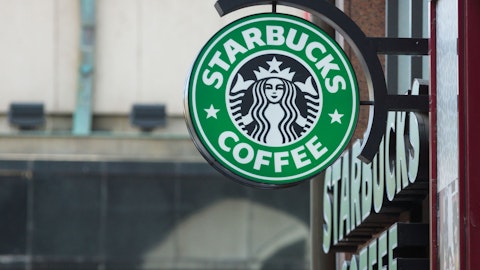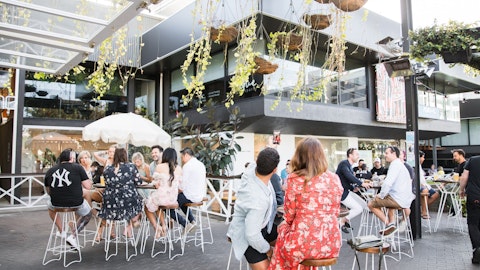Ricardo Cardenas: Yes, Chris. If you think about the mix, we’re not going to comment as much about the mix impact to comp we did have a strong performance for everything possible that helped our comp. But we’re not seeing — as Raj said earlier, we’re not seeing a big check management. We’re not seeing a lot of shifting in mix because we’ve got a very strategic way methodical way we price so that we don’t get mix changes when we take price because we’ve learned this system over time, and it’s a proprietary way we do it, — we use it with our data scientists here. So we haven’t seen a whole lot of mix shift. And as I said in the beginning, we’ve seen — and the economy has seen a shift from good to services. So that could be why you haven’t seen a whole lot of shift in mix in our business and maybe in other — maybe in our competitors’ businesses.
Operator: Our next question comes from Jeffrey Bernstein with Barclays.
Jeffrey Bernstein: Great. Two questions. The first one just on the competitive outlook. I’m just wondering whether you’ve seen any change in competitive behavior. Again, you’re obviously servicing all ends of the spectrum here. So just wondering what you’re seeing from the competition. I know some are concerned of a potential uptick in discounting to drive traffic if commodity inflation were to continue to ease, I know that’s contrary to your strategy, to make sure not to deep discount, but just wondering what you’re seeing across the competitive landscape? And then I had one follow-up.
Ricardo Cardenas: Jeff, we haven’t really seen a lot of deep discounting in the competitive landscape. There aren’t many that are even on television. We’ve got one of the brands that had come off of TV over the years that have indicated they might come back on, but they’re not talking about the discounting when they knew that. I think as Raj mentioned, our margins are about pre-COVID levels. I think we were maybe 1 of 2 companies in the public space that had improvement in margin versus pre-COVID. And most of them are talking about trying to improve their margins. So I’m not going to talk about what I think they’ll do, but I’ll get you back to what we’re going to do. We’re going to continue to focus on our filters to evaluate our promotional messaging or any messaging that we do, elevating brand equity, simple to execute, not at a deep discount, sticking to our strategy of core guest growth and reacting accordingly.
So whatever the — whatever our competitors do, we’ll watch, but we’re going to stick to what we’ve been doing.
Jeffrey Bernstein: Understood. And then the follow-up is, broadly speaking, as you look at your fiscal ’23 guidance, whether Raj, on the specific numbers or Rick, just in terms of the broader thought process. But what do you think is to prioritize the best to worst line of — or in terms of all your guidance components, whether it’s comps, inflation, earnings, prioritize the best to worst line of sight to any of those. Just wondering what you find more or less difficult to potentially forecast as you think about the next few quarters going into potentially slowing economy.
Rajesh Vennam: Well, I think the biggest — all the one that’s going to have the most uncertain data is the traffic. I mean, what kind of traffic are we going to see? And we — obviously, we’ve used a wide range of roughly 3% on the back half to accommodate some consumer shifts, but there’s a meaningful change. That’s — obviously, that’s something that could have an impact. That’s really the big one. Dennis, inflation has been heard deferent, I mean there have been a multitude of factors that have been impacting inflation, right? You start with start off with the supply shortages and other things, labor impact. But now as labor starts to come down or get into a better shape, you’ve got weather events, obviously, global events. So there’s a lot going on. inflation is probably the second one. And to me, those are the 2 things. Outside of that, I think everything else was probably pretty well buttoned up.
Operator: Our next question comes from Peter Saleh with BTIG.
Peter Saleh: Great. Just 2 questions. First, on the never-ending possible promotion. Do you feel like the benefit of that never never-ending possible promotion, does that extend beyond the promotional window the 7 weeks? Are you able to hold on to those guests even though they might be purchasing something else on the menu?
Ricardo Cardenas: Yes, Peter, as we think about any promotional activity or any limited time offer activity more specifically. We want to make sure that, that limited time offer still elevates brand equity as we’ve said before. And so we think there is a little bit of a halo over that. Now is it going to be as strong as when you’ve got the promotional message coming out there, a limited time offer message, probably not. But as we’ve said — I think we said in prepared remarks, our year-to-date, our quarter-to-date comp sales are equivalent to our year-to-date comp sales. So it’s not like we’ve seen a big slowdown since we stopped never-ending possible. Now that’s across Darden, not necessarily across Olive Garden. But I think that’s the idea of marketing or messaging is that should endure longer than the limited time offer, and we think this one did.





